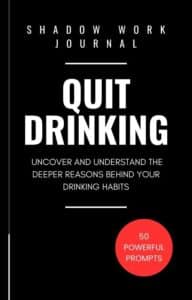In the labyrinthine journey of life, where paths are often shrouded in mist and the compass of the soul spins wildly, there exists a potent elixir that promises solace yet often leads one astray—alcohol. Its siren call has lured many into its deceptive embrace, offering the illusion of escape, only to weave chains of dependency that can bind the spirit. But what if you could break free? Imagine peeling back the layers of your being, confronting the shadows with courage, and emerging into the light of self-discovery and liberation. This is the essence of shadow work—a quest not for the faint of heart but for the valiant who dare to reclaim their power.
“50 Transformative Shadow Work Prompts to Help You Quit Drinking” is a crafted compendium of introspective torches designed to illuminate the crevices of your psyche that have been dimmed by the overcast of alcohol. Through these prompts, you will embark on an odyssey within, confronting the specters of habit, the phantoms of denial, and the wraiths of fear that have hitherto steered your course. With each question posed, you will unravel the threads of your own narrative, weaving a new tapestry of existence that is vibrant with the hues of sobriety and self-mastery.
As you delve into these pages, allow yourself to be vulnerable, to be honest, and to be transformed. Let each prompt be a stepping stone across the river of change, a river that flows toward a horizon of clarity and renewed purpose. The journey ahead is both an excavation and a construction—a tearing down of walls and a building up of fortresses within the self, fortresses of resolve, of dignity, and of unyielding determination to live a life unshackled.
Embracing Sobriety: The Comprehensive Guide to Quitting Drinking
The First Step Towards a New Horizon
Welcome, dear reader, to a pivotal moment in your journey—a moment where you stand at the crossroads between continuing a life with alcohol or stepping towards the path of sobriety. Quitting drinking is a deeply personal and transformative process that involves much more than abstaining from alcohol; it’s about reshaping your life, your habits, and your mindset. In this guide, we will explore the multifaceted concept of “quit drinking,” offering you insights, support, and a compass to navigate this life-changing voyage.
What Does It Mean to Quit Drinking?
Quitting drinking is a deliberate decision to stop consuming alcohol, either temporarily or permanently, for health, personal, or social reasons. It can be a choice to better oneself, to heal relationships, or to regain control over one’s life. Sobriety is not merely the absence of alcohol—it is the presence of a new way of living, thinking, and feeling.
The Journey of Quitting
Identifying the Need to Quit
Before one can embark on the road to sobriety, there must be a recognition of the need to quit. This may come from a place of self-realization, a concerning health diagnosis, or a series of events that highlight the negative impact of alcohol on one’s life. For some, it’s a quiet acknowledgment during a moment of reflection; for others, it’s a loud wake-up call in the form of a life-altering incident.
Planning Your Path to Sobriety
Once the decision is made, it’s essential to create a plan. This might include setting a quit date, informing friends and family of your intentions, and preparing for the challenges ahead. It’s wise to consider professional help, such as counseling or a support group, and to familiarize oneself with the stages of withdrawal.
The Role of Support Systems
No one should walk this path alone. Support systems, whether they consist of loved ones, support groups, or professional therapists, provide encouragement, advice, and a listening ear. They are the pillars that help hold you up when the journey gets tough.
Understanding and Overcoming Withdrawal
Withdrawal is a series of physical and psychological symptoms that occur when a body accustomed to regular alcohol intake suddenly stops or significantly reduces consumption. Symptoms can range from mild anxiety and restlessness to severe complications. Knowledge and preparation are key in managing this phase.
Building a Sober Lifestyle
Quitting drinking is not the end of the journey; it’s the beginning of a new lifestyle. Embracing hobbies, forging new relationships, and establishing routines that support a sober life are essential in maintaining long-term sobriety.
Relatable Examples: The Stories of Change
Meet John, a middle-aged marketing executive, whose habitual evening drinks turned into a dependency that cost him his job and strained his marriage. Or consider Lisa, a college student who realized her partying lifestyle was affecting her grades and mental health. Their stories, like many others, begin with a realization and continue with the challenging yet rewarding process of quitting drinking.
A New Chapter Awaits
Quitting drinking is not just about saying ‘no’ to alcohol; it’s about saying ‘yes’ to a life of clarity, health, and fulfillment. It’s a journey that will test your resolve, change your relationships, and challenge your old habits. As you conclude this guide and reflect on the steps ahead, remember that each day is an opportunity to write a new chapter in the story of your life—one where you are the protagonist in control of your destiny.
As you close this page and look towards your future, ask yourself, “What dreams will I chase with the newfound energy and clarity that sobriety brings?” Your answers are the milestones on your road to recovery, and each one is a testament to your strength and commitment. Embrace the journey, for your life awaits, rich with possibility and free from the hold of alcohol.

Embracing the Shadows: How Shadow Work Can Illuminate Your Path to Sobriety
Journeying Within to Emerge Without Alcohol
Imagine embarking on a quest not through the external wilderness but through the intricate landscape of your inner self. This is the heart of shadow work—an introspective voyage that seeks to bring to light the hidden parts of your psyche, the ‘shadows’ that often guide your actions without your conscious awareness. In the context of quitting drinking, shadow work is not just a practice but a transformative experience that can empower you to break free from the chains of alcohol dependency.
Defining Shadow Work
The Roots of Your Inner Shadow
Shadow work, a concept originally coined by Swiss psychiatrist Carl Jung, involves confronting and understanding the aspects of your personality that you’ve pushed into the unconscious—parts that may include repressed ideas, instincts, impulses, and weaknesses. These are elements of your persona that, for various reasons, you’ve chosen to ignore or hide from your conscious self and, consequently, from others.
The Light That Shadows Cast
Engaging in shadow work means shining a light on these obscured facets of your being. It’s about exploring the buried emotions and thoughts that have silently steered your behaviors, potentially leading you down the path of alcohol misuse. The goal is not to eradicate these shadows but to integrate them into your conscious self, acknowledging their presence and understanding their influence over your life choices.
Shadow Work’s Role in Quitting Drinking
Unveiling the Hidden Triggers
For many, alcohol consumption is a way to cope with uncomfortable feelings or situations—an escape from reality. Shadow work helps you identify the emotional triggers and unconscious motives behind your drinking. It prompts you to ask: What pain am I numbing? What reality am I avoiding? By bringing these to the surface, you gain the insight needed to address them directly rather than through the numbing effects of alcohol.
Transforming Your Relationship with Alcohol
Through the practice of shadow work, you’ll be able to see your relationship with alcohol in a new light. You may discover that drinking serves as a false companion—a mere shadow offering the illusion of comfort or escape. Recognizing this can be a powerful catalyst for change, pushing you to seek healthier ways to deal with life’s challenges.
The Benefits of Shadow Work in Sobriety
Empowerment Through Self-Awareness
As you engage with your shadow, you’ll begin to understand the full spectrum of who you are, including strengths you may have overlooked. This newfound self-awareness brings with it a sense of empowerment. You’ll find the strength to make conscious choices about your behavior, including the decision to quit drinking.
Healing the Whole Self
Shadow work facilitates a holistic healing process. By accepting all parts of yourself, you can achieve a sense of wholeness and balance that was previously disrupted by alcohol dependency. This integration promotes a healthier, more harmonious existence, where the urge to drink loses its power.
Stepping Out from the Shadows into Sobriety
Your journey through shadow work is deeply personal and uniquely transformative. It’s a path that requires courage, honesty, and a willingness to face the unknown territories within you. As you continue to explore and reconcile the darker aspects of your psyche, you’ll emerge stronger and more resilient, with a profound sense of clarity and purpose.
As you stand at the crossroads, the shadows behind you and the light of sobriety ahead, ask yourself this: Are you ready to step into the light of your truth, leaving behind the shadow of alcohol that no longer serves you? The path is before you, and each step you take is a testament to your courage and your commitment to a life of authenticity and freedom.

Shadow Work Prompts to Quit Drinking
Imagine your life as a garden. How has the habit of drinking acted as a weed in this garden? What beautiful plants could grow in its place once it’s removed?
If your urge to drink was a character in a story, what would its motives be? What backstory would explain its presence in your life?
When you think about quitting drinking, what emotions surface? Are there any emotions that you’ve been trying to numb with alcohol that might need your attention?
Envision a conversation with your future self, who has successfully quit drinking. What wisdom do they share about the journey of getting there?
Reflect on the role models in your life. How have their attitudes towards alcohol influenced your own? What patterns do you wish to change?
Consider the last time you wanted a drink. What were you feeling or avoiding feeling at that moment? What healthier coping mechanism can replace drinking for you?
If alcohol was no longer available to you, imagine what alternative activities or hobbies might fill your time. What new passions could you explore?
What are the myths you’ve told yourself about drinking? How do these myths differ from your lived experience?
Write a letter to alcohol as if it were an old friend you’ve outgrown. What would you thank it for, and why is it time to part ways?
Identify the moments when you feel strongest in your resolve to quit drinking. What is it about these moments that fortify you?
Acknowledge the fears you have about quitting. What is the worst that could happen, and how can you prepare for or accept it?
Think of your body as a temple. How has alcohol desecrated this sacred space, and what can you do to restore its sanctity?
How does alcohol dull your potential? Visualize your capabilities and achievements in a life without alcohol’s haze.
Consider the financial aspect of drinking. How might your resources be better allocated to serve your dreams and goals?
Analyze the triggers that lead you to drink. What patterns emerge, and how can you disrupt these patterns consciously?
If drinking was no longer a chapter in your life story, how would the narrative change? What new plotlines could emerge?
What internal voids have you attempted to fill with alcohol? How can you address these voids with self-compassion and healing?
Explore the lineage of drinking in your family. How has this legacy impacted you, and how do you want to redefine it?
Imagine alcohol as a barrier. What is it keeping you from reaching or experiencing in your life?
Reflect on the relationships that have been affected by your drinking. What steps can you take to mend or improve these relationships?
If alcohol were a mask you wore, what would it be concealing? What truths about yourself are you ready to face?
Contemplate the times you felt most alive and joyful. Were these moments connected to alcohol, or did they transcend it?
What has been the role of peer pressure in your drinking habits? How can you assert your independence and make choices that align with your well-being?
Envision your daily routine without alcohol. What positive differences do you notice in your health, mood, and productivity?
Identify the values that are most important to you. How does quitting drinking align with these values?
If you were to create a support system for your journey to quit drinking, who would be in it and why?
How has alcohol affected your self-esteem and self-worth? In its absence, how might you rebuild a stronger sense of self?
Consider the excuses you’ve made to continue drinking. What truths are these excuses masking?
Imagine alcohol as a thief. What has it stolen from you—time, health, memories? How will you reclaim these treasures?
What would you say to someone you love if they were struggling with alcohol? Can you extend the same compassion and advice to yourself?
Recall a moment when you felt a strong urge to drink but chose not to. What strengths did you draw upon, and how can you cultivate them further?
How does alcohol influence your decision-making? What decisions would you make differently without its influence?
Reflect on the concept of freedom. How does quitting drinking contribute to your personal sense of freedom?
If you could visualize your life energy as a color, how has the hue been altered by alcohol? What color represents your energy sober?
Explore the idea of resilience. How has your journey with alcohol and the decision to quit demonstrated your resilience?
What are the lessons you’ve learned from your relationship with alcohol? How can these lessons inform your future choices?
Imagine your life as a book. What title would you give to the chapter about quitting drinking, and why?
How has alcohol served as a form of escapism for you? What realities are you ready to face head-on?
If alcohol was a contract you signed, what terms would you negotiate to break it and regain control?
Think about the role of alcohol in your social life. How can you maintain or build connections without it?
What aspects of your mental health have been impacted by drinking? How might your mental wellness improve with sobriety?
Engage with the idea of patience. What does the journey of quitting drinking teach you about being patient with yourself?
How does alcohol skew your perception of time? What might you accomplish with a clearer sense of temporal awareness?
If you could communicate with the part of yourself that craves alcohol, what would you say to soothe it?
Reflect on the physical sensations of drinking. What healthier sensations would you like to invite into your body?
Consider the role of accountability in quitting drinking. How can you hold yourself accountable in a supportive and non-punitive way?
How has alcohol shaped the narrative you have about who you are? What new narrative would you like to write?
If drinking was a distraction, what are the important things in life from which it has been distracting you?
Contemplate the power of habit. How can you create new, empowering habits to replace the routine of drinking?
Imagine the sense of accomplishment you will feel once you’ve quit drinking. How can this vision of success motivate you in moments of temptation?
Shadow Work Journal to Quit Drinking
50 Shadow Work Prompts to Uncover and Understand the Deeper Reasons Behind Your Drinking Habits

The Struggle You Know All Too Well
You’ve been trying to cut back on drinking, but no matter how many times you’ve promised yourself ‘just one last drink,’ you find yourself trapped in the same cycle. The temporary escape alcohol provides quickly fades, leaving you with a lingering sense of unfulfillment and a trail of broken promises. This is a problem you can’t seem to shake off, and it’s affecting every facet of your life—your health, your relationships, and your peace of mind.
The Pain That Runs Deep
It’s not just about the physical cravings—it’s the emotional turmoil that accompanies them. The guilt, the anxiety, the hidden wounds that you’ve been numbing with every sip. You’ve tried to quit before, and the recurring setbacks make you feel like you’re in a never-ending battle with yourself. You’re weary, you’re frustrated, and you’re looking for a way out—a solution that addresses the root cause of your struggle, not just the symptoms.
Your Path to Lasting Change
Introducing the **Shadow Work Journal to Help You Quit Drinking**—your personal guide to uncovering and understanding the deeper reasons behind your drinking habits. This transformative journal is more than just a diary; it’s a powerful tool designed to illuminate the hidden aspects of your psyche that influence your relationship with alcohol.
Discover Your Triggers
Through carefully crafted prompts, you’ll delve into the core of your being. You’ll learn to identify the triggers that lead to drinking, the unmet needs you’re trying to fulfill, and the past experiences that have shaped your current behavior. This is where healing begins.
Gain Control and Empowerment
As you progress through the journal, you’ll develop a profound understanding of your shadow—the unconscious parts of yourself that you’ve been avoiding. By bringing these to light, you’ll gain the clarity and strength needed to make empowering decisions. You’ll start to see yourself as the powerful individual you are, capable of overcoming the urge to drink and transforming your life.
Create a Sober, Fulfilling Life
The Shadow Work Journal is your companion in creating a new lifestyle—one where sobriety isn’t a burden, but a liberating choice that leads to a more authentic, joyful, and purposeful existence. With each page turned, you’ll find yourself moving closer to the life you’ve always wanted—one free from the shadows of alcohol.
Your New Chapter Awaits
The Shadow Work Journal to Help You Quit Drinking is more than just a book; it’s a passage to a new chapter in your life. It’s time to step out from the shadows and embrace the light of self-awareness, empowerment, and true freedom. Begin your transformative journey today, and rediscover the joy of living a life unclouded by alcohol.
Now, as you stand at the precipice of this profound journey, pausing to reflect on the terrain you have traversed, take a moment to acknowledge your bravery. The path of shadow work is not trodden by many, for it requires a confrontation with the deepest aspects of oneself—those hidden in the penumbra of consciousness. Yet, you have dared to venture forth, armed with introspection and the will to transform.
As you close the cover on “50 Transformative Shadow Work Prompts to Help You Quit Drinking,” remember that the end of this book is not the end of your quest. The insights gleaned and the truths uncovered are but seeds planted in the fertile ground of your being, seeds that, with care and commitment, will bloom into a garden of serenity and strength.
In the quiet that follows, ponder this: What will you do with the newfound space within, once cluttered by the debris of drink, now cleared and ready for creation? Let this question resonate in the silence, and may it guide you as you continue to craft a life rich with meaning, a life where every moment is lived in vivid sobriety.
Step forward, intrepid traveler, for your story is still being written, and the pen rests firmly in your hand.

